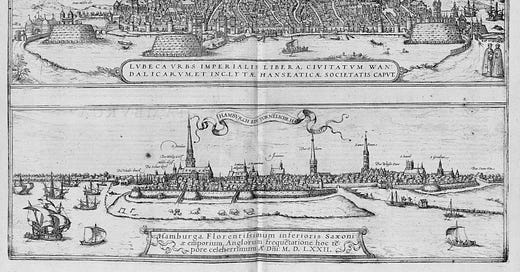I'm Selling the City of Hamburg
And I promise that I care more about you than I care about wealth and power.
Michael Yon has an interesting report on the status of the U.S. migrant invasion. And he says the “invasion plumbing remains intact and operational.”
The question of the century is not what legalized mass migration will do to Europe and North America, but why our own leaders are enabling mass migration. (Hint: if you think your politicians care more about you and the migrants than they care about wealth, power, and security, then I will sell you the city of Hamburg for pfennigs on the mark.)
The image of Stockholm that Yon posted on X contrasts the Europe of 1560 with the Not Europe of today. And the answer to the question of the century can be found in the Europe of the 1500’s, which was still governed by a network of independent city-states.
What’s happening in the 21st century is the same thing that happened in the 16th century: politicians lost confidence in their own form of government and decided to replace it with something else.
If you want a glimpse of that old world order, you should listen to my podcast. Episode 4 touched on the Hanseatic League.
The Hansa ruled Europe from the 13th to the 15th century as “a confederation of cities, towns and communities, for the purpose of ensuring that business enterprises by land and sea should have a desired and favorable outcome, and that there should be effective protection against pirates and highwaymen.”
The medieval trade network stretched from England to Arabia, Gibraltar to Gdansk, and the League had the power to exclude any city that did not follow its rules. Member cities numbered more than 200 at the height of the League’s power.
The League had no legal authority, no navy, and no army, but it was more capable than any monarch of protecting its members’ interests. To that end, it effectively used persuasion, arbitration, sanctions, and the creation or blockade of trade. War was also on the table, but usually as a last resort.
By 1560, the League had lost most (but not all) of its power, and the number of member city-states had dramatically declined. Even so, it didn’t dissolve until 1630, and the last official meeting didn’t happen until 1669.
For some 300 years, the Hansa had managed to avoid the heavy expenses of a centralized government and wars imposed by an all-powerful monarch — an arrangement the all-powerful monarchs didn’t much appreciate.
By the beginning of the 30 Years War in 1618, city-states such as Lubeck and Hamburg had passed the height of their powers, and nation-states such as Germany, Sweden, and Italy began to take charge of wealth, power, and security. (Hint: their leaders didn’t do this for the good of the people.)
The old version of Europe’s economy, and the merchant communities that created it, was unable to withstand the rise of hegemonic empires.
The new world order didn’t solidify until the 1648 Peace of Westphalia. Those negotiations took 10 years to complete, but they finally ended the 30 Years War, and most people don’t know that we in the West today are still living under the form of government that was negotiated amidst the ashes of the Hanseatic League.
Almost 400 years later, the nation-state is the old world order. Europe’s leaders have lost confidence in that model, and in the value of free speech that underpins the experiment we call Western Civilization.
The nation-state has lost legitimacy in the minds of its own leaders, and so they are delegitimizing their own governments in the quest for an even bigger form of government — one that they think will command more wealth, power, and security.
The new world order is still under negotiation, and some of us may not live to see the result. But if you think the UK, the European Union, the U.S., or the United Nations cares about you and the migrants, then I will sell you the city of Brussels for pennies on the euro.





PragerU has a podcast they recently dropped that I will listen to sometime this week. It's a provocative title, "The Case for Anarchy: What a government-free America might look like."
This seems much like what Michael Malice seems to be promoting but I will have to listen and see how they lay it all out.